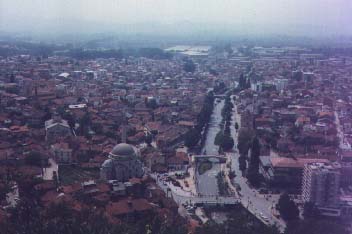Source: http://www.alb-net.com/kcc/043099e.htm
Accessed 30 April 1999U.N. Fears Ethnic Purge Of Kosova's Prizren
By Peter Graff
KUKES, Albania (Reuters) - Thousands of ethnic Albanian refugees from Kosova crossed into
Albania Friday with one U.N. official warning the ``final cleansing'' of the city of
Prizren was under way.
``It has been a thousand an hour for several hours,'' said Ray Wilkinson, spokesman for
the United Nations High Commissioner for Refugees. ``We think it is five, six thousand
(since 0600 GMT) ... we've stopped counting.''
A Reuters correspondent at the scene said there were so many people trying to cross the
frontier that movement had slowed to a snail's pace.
The refugees, most from the Prizren area in the southwest of the Serbian province, were
crossing in cars, tractors and on foot. Most said they had only been evicted from their
homes by Serbian authorities in the past 24 hours.
``We have started to hear that panic is setting in,'' Wilkinson said. ``To me it seems
that this is the final cleansing of Prizren. A lot of these people are saying 'my god,
everyone is leaving ... I've got to leave'.''
One resident of Prizren who crossed at 1200 GMT told Reuters he fled because all his
neighbors appeared to be going.
``When we saw people leaving, we just got up and joined them, said Kujtim Osmani.
Over 730,000 ethnic Albanians have been expelled or have fled their homes in Kosova since
March last year -- most since the beginning of a NATO bombing campaign against Yugoslavia
five weeks ago.
Albania is already home to over 370,000 refugees from Kosova who have swollen the
population of Europe's poorest country by more than 15 percent.

The view of Prizren from its castle before the ethnic cleansing by the Serbs
started. Photo by Alb-Net Staff
In the capital Tirana, aid officials said seven new camps
may be set up to cope with an influx that threatens to overwhelm the hastily-arranged
facilities already in place.
U.S., British, French and United Nations officials coordinating relief efforts hope to
have plans ready by the end of the week for the new camps, which they say must eventually
be capable of housing another 150,000 people.
The UNHCR says some 100,000 of these are now living either in existing camps or communal
housing facilities.
Another 100,000 or so are hunkered down in Kukes, about 30 kms (20 miles) south of the
Kosova border, hoping for the conflict to soon end so they can return home.
They have disregarded UNHCR pleas to move farther south where they can be better cared for
-- and where they would be out of range of Serbian artillery along the border.
``There are lots of sites that have spontaneously sprung up,'' said UNHCR spokeswoman
Ariane Quentier.
While Tirana and camps in the northern part of the country are now filled to overflowing,
the Albanian government says some camps to the south have lots of room.
Local police have set up roadblocks outside Tirana to stem the flow of refugees into the
capital.
The government said there was room for another 40,000 people in Durres on the Adriatic
coast and for 30,000 more in Elbasan, south-east of the capital.
NATO forces in the region have become a vital part of the relief effort, U.N. officials
said.
As part of the NATO mission, several hundred French soldiers have been dispatched to
Tirana and Durres for a job described by their commander as ``humanitarian and only
humanitarian.''
French Prime Minister Lionel Jospin began a two-day visit to refugee camps and French
troops Friday, to assess the refugee situation and aid needs in Albania and Macedonia.
In Durres, a senior NATO officer said refugees in northern Albania could be shelled by
Serbian artillery so NATO was working with UNHCR to move around 4,000 people a day away
from the border.
British Lieutenant-General John Reith, head of NATO's Albanian Humanitarian Force (AFOR),
said refugees were in danger because Kosova Liberation Army fighters were operating from
the Kukes area within range of Serbian guns across the border. |

 Document compiled by Dr S D Stein
Document compiled by Dr S D Stein